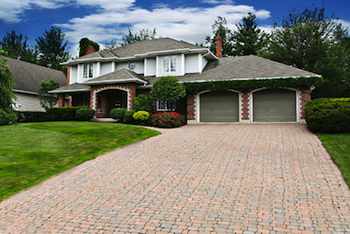By Cara Smusiak

Clay bricks and pavers offer the benefits of a natural material. You can also pave with concrete bricks, which are a little more durable but less eco-friendly
Summer is swiftly approaching, and you know what that means: it's construction and home improvement season. Across America, homeowners will be repaving or adding a layer of tar to their asphalt, but before you call your local driveway builder, consider investing in a greener option.
Asphalt is complex, petroleum-based mix of chemicals, the exact composition of which varies by manufacturer. It contains aliphatic hydrocarbons, polycyclic aromatic hydrocarbon (PAH) mixtures, and a variety of other toxic and carcinogenic compounds.
Many homeowners will use coal tar driveway sealants to maintain and improve the lifespan of their asphalt driveways, but these products are worse than asphalt products.
Austin, Texas, took the bold step of banning the use of coal tar sealants after USGS research revealed these sealants were responsible for the PAHs that were contaminating local streams. The ban took effect in 2006, and in 2009, Washington, D.C., followed in Austin's footsteps.
The good news is there are alternatives for homeowners who want or need to resurface their driveway in an environmentally responsible way.
A gravel driveway is a simple and affordable alternative to asphalt. Gravel is a natural mineral/stone material, but there is the environmental footprint of gravel quarrying to consider. That said, more gravel means less traction, so you won't use much (a two-inch depth at most).
Gravel isn't the best option if you get a lot of snow in the winter; it can make snow removal difficult, and annual spring maintenance is all but a certainty. Sloped driveways are also a deal-breaker, since gravel won't stay put.
Concrete and cement driveways offer big benefits. They're durable, low-maintenance, and the lighter color means they will attract and hold less heat, making your home and yard just a wee bit cooler when summer temperatures soar. For a price, faux finishes can also make your concrete driveway look like stone, brick, tile or slate. Concrete is greener than asphalt, but many products do contain fly ash, a by-product of coal power plants, and slag cement, a by-product of iron processing for steel production.
Another big benefit of concrete is its longevity. Many concrete driveways have a lifespan of 30 years or longer, no major maintenance required. So while it might cost you double what an asphalt driveway would today, you'll save money in the long run.
Interlock brick is another greener way to pave. Clay bricks offer the benefits of a natural material, which is a far more eco-friendly option for your driveway (and patios and pathways) than tar-based products. You can also pave with concrete bricks, which are a little more durable, but a little less eco-friendly.
The problem with bricks is they can wreak havoc with your snow blower and make shoveling a little more challenging in the winter months. But if you pick up a few extra bricks--like you would buy an extra box of tiles for future repairs--you can pop a broken brick out and plug a new one in its place in no time.
Perhaps the most eco-friendly option for homeowners is a grass driveway. Your first thought might be, of your tires spinning in a muddy mess after a long day of rain, but grass driveways aren't simply an extended lawn.
Grass driveway designers are using the same technology that some golf courses use to keep their grass picture-perfect. A plastic structure below the grass is used to protect he root systems and evenly distribute the load of vehicles. This ensures a stable driveway with minimal maintenance (other than mowing the driveway, that is).
Though the costs of eco-friendly driveway options are considerably higher (with the exception of gravel), it's an investment in the health of your family and the environment.
© Naturally Savvy
AUTOS | HOBBIES | EDUCATION | FAMILY | FASHION | FOOD & RECIPES | HOME DECOR | RELATIONSHIPS | PARENTING | PETS | TRAVEL | WOMEN
Home & Garden - Banish Tar: Get a Greener Driveway